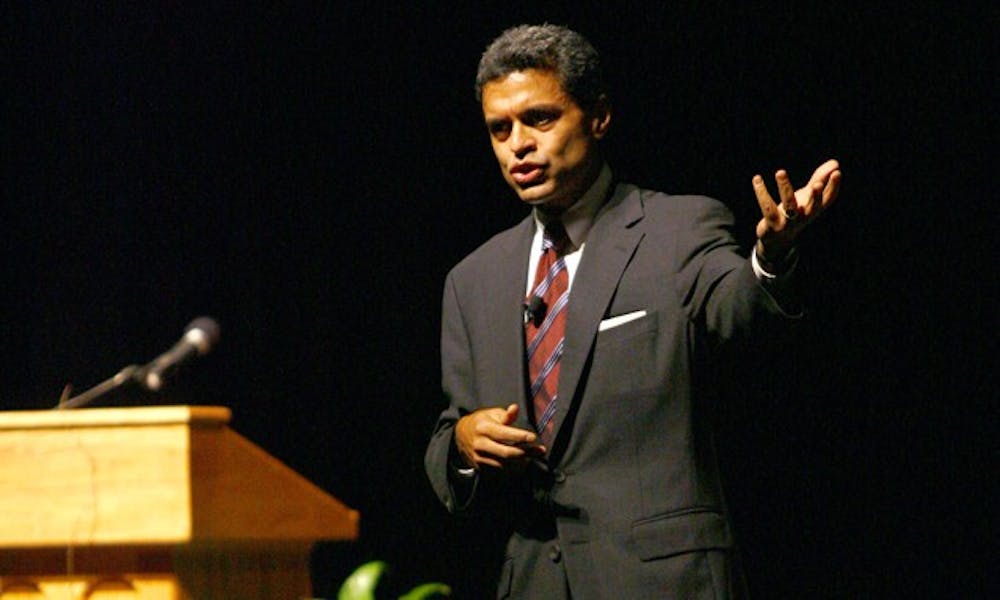It is only a matter of time before the United States is eclipsed as the socioeconomic center of the world stage, says Fareed Zakaria.
Noting the rise of developing nations, Zakaria, editor of Newsweek International and host of the CNN foreign-affairs show “Fareed Zakaria GPS,” discussed the United States’ future position in front of a packed audience in Page Auditorium Monday night.
Zakaria’s speech was this year’s Ambassador S. Davis Phillips Lecture, co-hosted by the Sanford School of Public Policy, the Duke University Program in American Grand Strategy and the Triangle Institute for Security Studies.
Zakaria, best-selling author of “The Post-American World,” began his speech by describing how the nation’s economic situation has changed greatly over the past year, noting that most people initially predicted another depression. He added that an economic collapse as drastic as the Great Depression would be unlikely today.
“We don’t really understand that we are living in a world with deep and powerful roots of stability,” he said.
On the 20th anniversary of the fall of the Berlin Wall, Zakaria said the biggest effect of the collapse of the wall and of the Soviet Union was a marked decrease in the number of people who died as a result of war.
“We have an extraordinary reality of political stability,” he remarked.
Zakaria also discussed the importance of economic stability, noting that the current recession will deprive many people of future earnings. He said that although the number of countries plagued by hyperinflation in 1979 was an astounding 79, the only country with hyperinflation today is Zimbabwe.
In addition, he described the technological revolution as the third greatest stabilizing factor in today’s world.
“The great revolutionary technology of 1989 was the fax machine,” Zakaria said. “This was before computers and iPods. It was a very different world.”
Technology has created a seamless and integrated world system, he said, adding that dozens of countries have learned to thrive through technology.
Another result of this technological and economic stability is a decrease in the number of people living in poverty. In fact, the number of people who have risen out of poverty in the last 75 years is approximately 400 million, Zakaria said.
For the rest of the speech, Zakaria focused on the rise of countries in Asia, Africa and Latin America in the economic and political spheres, observing that the United States no longer has the biggest gambling center nor the largest mall in the world.
“We’ve lost shopping and gambling. What is left for the American people,” he said, eliciting laughter from the audience.
Describing what the rise of these countries might mean for the United States, Zakaria compared the nation’s current position to one that was held by Great Britain in the 1920s, when everyone looked to London as the economic and political world giant. But eventually, the United States and Germany surpassed Great Britain in industrial power, he said.
Zakaria said he does not believe this will necessarily happen to the United States.
“I tend to be an optimist,” he said. “We are not Great Britain. We are still vibrant in our economy and society.”
But Zakaria noted that the United States will have to make changes in its investments. While the nation has spent nearly a trillion dollars in Iraq, it has not spent enough money on science and education, Zakaria said.
“We are an enormously rich country, but we have to prioritize,” he said.
Zakaria ended the talk by identifying America’s greatest challenge: reinvigorating its political and economic dynamics.
“My greatest fear is that 200 years from now, a historian will say that the U.S. has globalized the world—it has just forgotten to globalize itself,” he said.
The audience responded positively to Zakaria’s advice on America’s grand strategy.
“I thought it was a superb talk,” said Provost Peter Lange. “It showed both great and moderate insight.”
Get The Chronicle straight to your inbox
Signup for our weekly newsletter. Cancel at any time.

